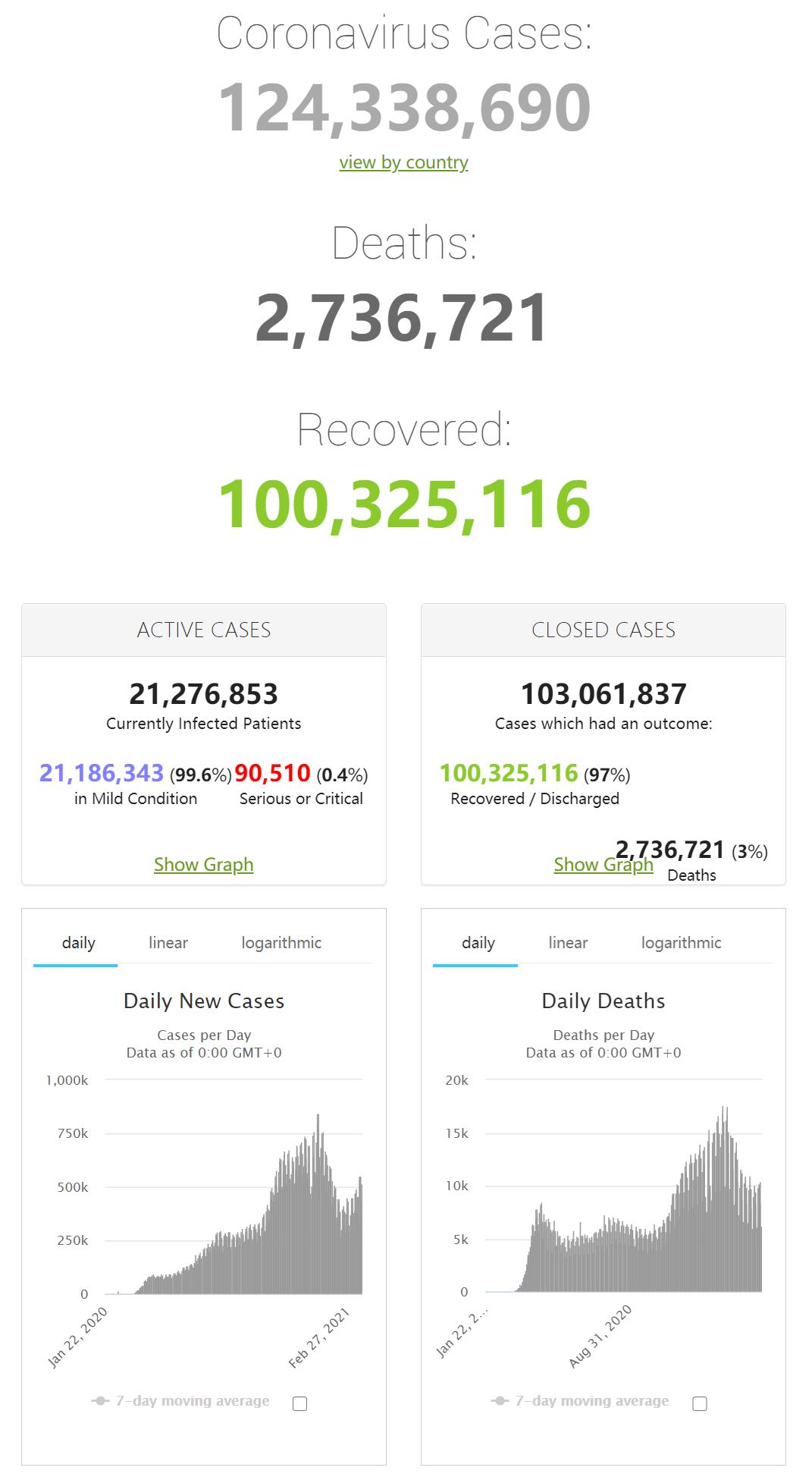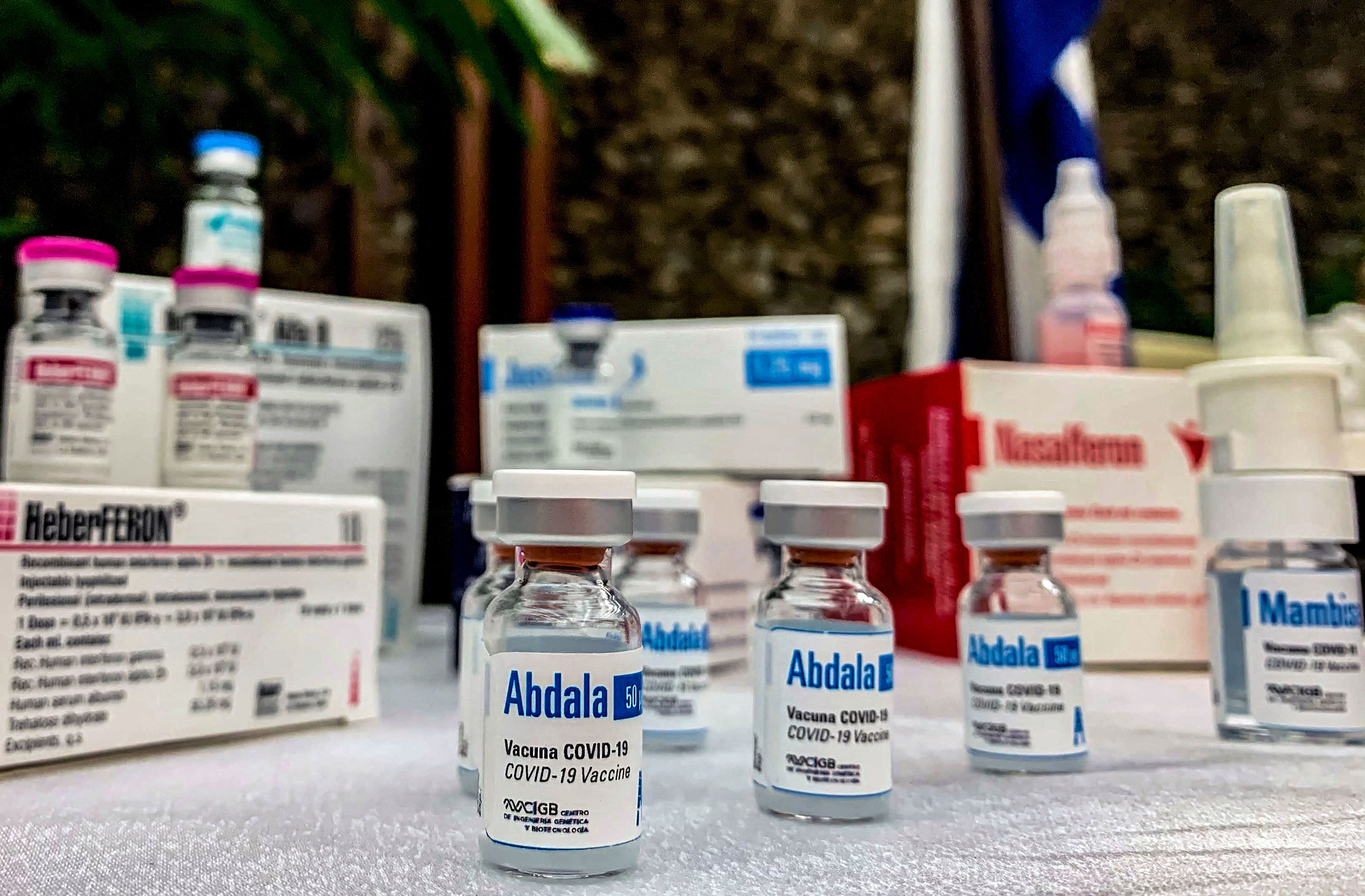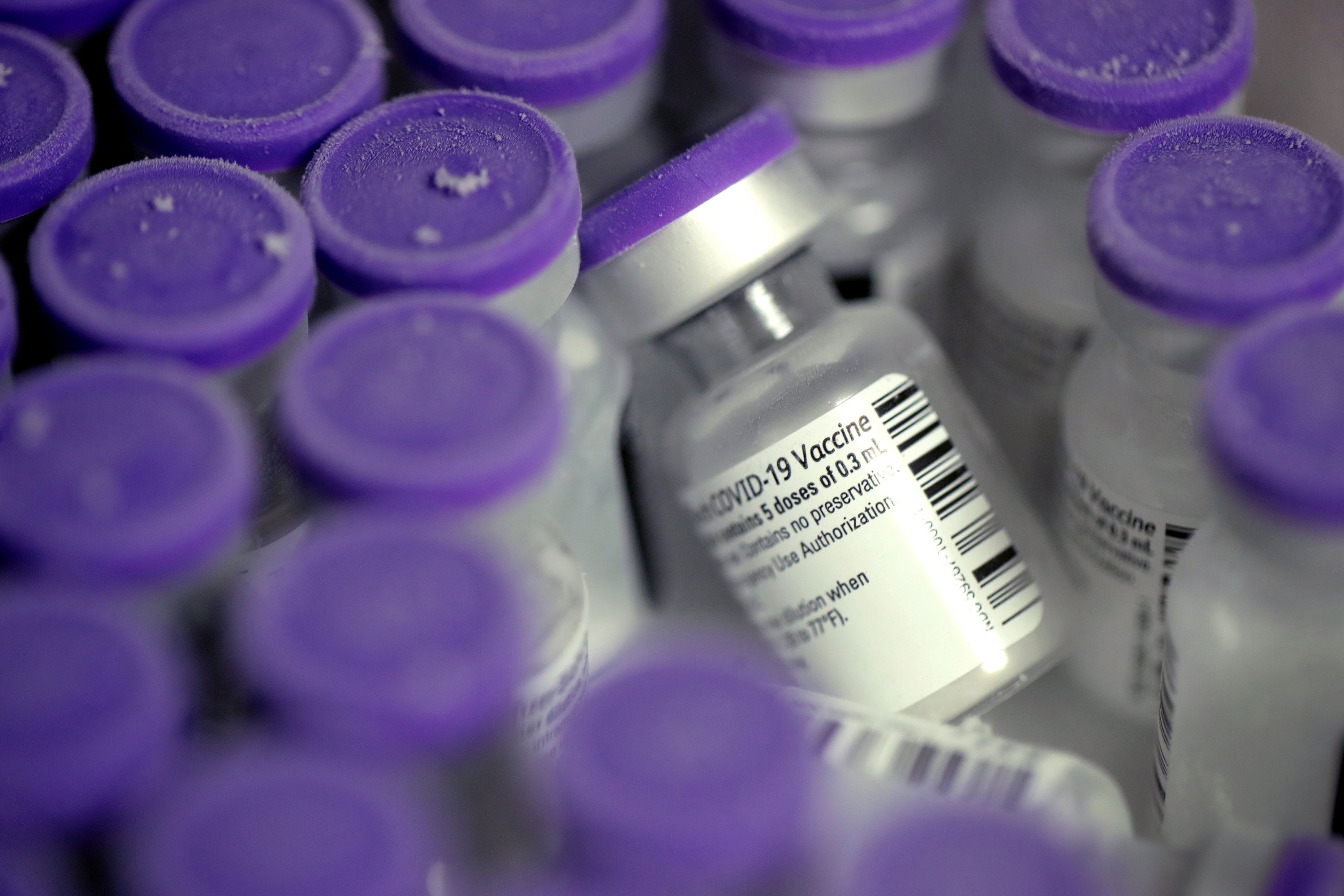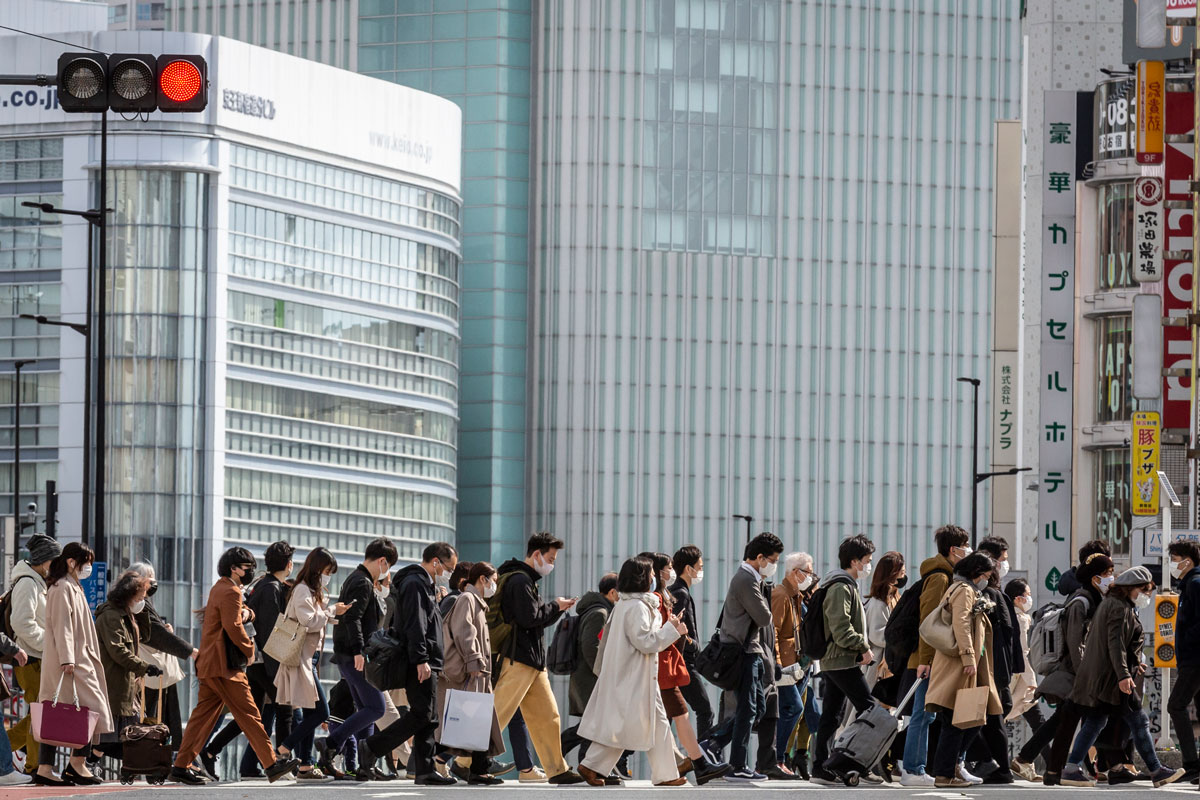
 i_need_contribute
i_need_contribute


|
Country, |
Total |
New |
Total |
|
World |
124,289,201 |
+405,395 |
2,735,156 |
|
30,576,962 |
+45,748 |
555,945 |
|
|
12,051,619 |
+53,386 |
295,685 |
|
|
11,686,330 |
+40,611 |
160,200 |
|
|
4,466,153 |
+9,284 |
95,391 |
|
|
4,301,925 |
+5,342 |
126,172 |
|
|
4,298,395 |
+15,792 |
92,621 |
|
|
3,400,877 |
+13,846 |
105,328 |
|
|
3,228,803 |
+4,420 |
73,543 |
|
|
3,035,338 |
+22,216 |
30,178 |
|
|
2,678,262 |
+8,262 |
75,418 |
|
|
2,342,278 |
+5,128 |
62,148 |
|
|
2,252,172 |
+6,401 |
54,671 |
|
|
2,195,772 |
+2,133 |
198,036 |
|
|
2,073,129 |
+14,578 |
49,365 |
|
|
1,808,422 |
+7,357 |
61,877 |
|
|
1,554,256 |
+7,893 |
30,098 |
|
|
1,538,451 |
+599 |
52,196 |
|
|
1,472,790 |
+6,464 |
50,339 |
|
|
1,467,371 |
+2,389 |
24,965 |
|
|
1,465,928 |
+5,744 |
39,711 |
|
|
1,207,806 |
+6,261 |
16,290 |
|
|
938,719 |
+4,934 |
22,716 |
|
|
938,094 |
+6,155 |
22,359 |
|
|
900,858 |
+3,743 |
22,268 |
|
|
837,006 |
+4,255 |
22,707 |
|
|
828,764 |
+992 |
6,109 |
|
|
817,778 |
+248 |
16,784 |
|
|
798,547 |
+4,655 |
14,036 |
|
|
671,792 |
+8,019 |
12,972 |
|
|
630,471 |
+3,669 |
13,863 |
|
|
580,642 |
+9,046 |
18,451 |
|
|
573,687 |
+2,809 |
8,720 |
|
|
555,897 |
+4,769 |
4,966 |
|
|
544,724 |
+9,269 |
5,985 |
|
|
516,565 |
+2,412 |
9,089 |
|
|
491,834 |
+125 |
8,769 |
|
|
456,781 |
+1,143 |
8,835 |
|
|
442,226 |
+1,871 |
1,445 |
|
|
441,014 |
+1,446 |
5,808 |
|
|
385,424 |
+404 |
6,613 |
|
|
351,213 |
+222 |
6,052 |
|
|
349,270 |
+401 |
9,104 |
|
|
334,156 |
+1,116 |
1,238 |
|
|
312,851 |
+253 |
16,478 |
|
|
311,428 |
+983 |
2,166 |
|
|
307,890 |
+4,467 |
12,188 |
|
|
277,650 |
+170 |
3,710 |
|
|
276,056 |
+150 |
3,019 |
|
|
264,634 |
+223 |
12,060 |
|
|
257,789 |
+150 |
5,786 |
|
|
249,776 |
+313 |
3,275 |
|
|
246,974 |
+670 |
3,366 |
|
|
245,923 |
+217 |
8,569 |
|
|
238,830 |
+1,705 |
7,531 |
|
|
232,906 |
+1,208 |
2,934 |
|
|
231,119 |
+520 |
4,588 |
|
|
226,777 |
+1,272 |
2,402 |
|
|
225,976 |
+2,338 |
2,458 |
|
|
220,455 |
+1,330 |
1,233 |
|
|
216,094 |
+1,060 |
4,590 |
|
|
209,347 |
+325 |
3,489 |
|
|
206,317 |
+290 |
3,976 |
|
|
196,112 |
+1,990 |
3,769 |
|
|
196,061 |
+643 |
11,637 |
|
|
188,902 |
+1,537 |
2,674 |
|
|
188,119 |
+208 |
6,710 |
|
|
184,219 |
+506 |
3,360 |
|
|
182,409 |
+478 |
4,443 |
|
|
174,228 |
+519 |
274 |
|
|
161,868 |
+131 |
2,030 |
|
|
154,627 |
+3,290 |
5,938 |
|
|
152,510 |
+905 |
2,513 |
|
|
151,894 |
+771 |
1,502 |
|
|
151,528 |
+728 |
1,629 |
|
|
142,246 |
+34 |
3,204 |
|
|
136,741 |
+759 |
502 |
|
|
122,040 |
+1,130 |
2,023 |
|
|
121,544 |
+344 |
2,145 |
|
|
119,828 |
+450 |
3,503 |
|
|
116,255 |
+98 |
3,061 |
|
|
99,075 |
+410 |
1,697 |
|
|
97,586 |
+177 |
1,828 |
|
|
96,394 |
+993 |
797 |
|
|
90,514 |
+314 |
551 |
|
|
90,106 |
+7 |
4,636 |
|
|
88,035 |
+1,096 |
649 |
|
|
87,638 |
+426 |
1,208 |
|
|
87,462 |
+73 |
1,490 |
|
|
86,535 |
+86 |
1,182 |
|
|
84,230 |
+2,693 |
811 |
|
|
81,446 |
+107 |
622 |
|
|
72,073 |
+430 |
808 |
|
|
67,476 |
+718 |
397 |
|
|
42,653 |
+176 |
494 |
|
|
42,628 |
+410 |
245 |
|
|
27,876 |
+73 |
91 |
|
|
9,067 |
+1 |
177 |
|
|
8,800 |
+29 |
82 |
|
|
2,575 |
+3 |
35 |
Retrieved from: https://www.worldometers.info/coronavirus/
From CNN’s Karol Suarez and Patrick Oppmann

Vials of the Abdala vaccine candidate are seen during a press conference in Havana, Cuba, on March 19. Katell Abiven/AFP via Getty Images
Embattled Venezuelan President Nicolas Maduro announced two of Cuba’s vaccine candidates would arrive in Venezuela in the first week of April.
“We will participate in phase three of their clinical trials heading to this vaccine's mass production," he said during a news conference on Sunday.
Maduro said 30,000 doses of Soberana 02 and 30,000 doses of Abdala will come into the country. Both vaccine candidates are in phase 3 clinical trials.
“I thank President Diaz Canel, the Cuban Public Health System, Army General Raúl Castro, and thank you for incorporating Venezuela in these trials; we're together creating the answers and solutions of our Caribbean Latin America," Maduro said.
On March 4, Sacha Llorenti the executive director of ALBA-TCP (Bolivarian Alliance for the Peoples of Our America – Peoples' Trade Treaty), a regional bloc of left leaning Caribbean and Latin American countries, announced the creation of a vaccine bank for its member countries. Cuba and Venezuela are both members of ALBA and the delivery of the vaccines will take place through the organization according to Cuban state media.
The vaccine bank is for member states to use if they are in need and vaccines developed in Cuba will have priority to be part of the bank.
From CNN's Deidre McPhillips

Scott Olson/Getty Images
More than 126.5 million doses of Covid-19 vaccine have been administered in the United States, according to data published Monday by the US Centers for Disease Control and Prevention.
The CDC reported that 126,509,736 total doses have been administered – about 81% of the 156,734,555 doses delivered. The CDC last updated total doses delivered on Saturday; CNN has reached out to the CDC to learn more about this.
That’s about 2 million more doses reported administered since yesterday, for a seven-day average of about 2.5 million doses per day.
About 1 in 4 people in the US – nearly 83 million people – have received at least one dose of vaccine, and more than 1 in 8 – about 45 million people – have been fully vaccinated, CDC data shows.
Note on the data: Data published by the CDC may be delayed, and doses may not have been given on the day reported.
From CNNs Antonia Mortensen in Milan, Italy
Poland’s Minister of Health Adam Niedzielski urged people to work from home saying according to the latest data, the dominant place in generating a new infection was the workplace.
“I received a report from the Department of Health and Safety, which identifies the recent outbreaks of disease in the country. The report covered the last three days, and almost 50% of coronavirus infections are identified in the workplace,” Niedzielski said during a news conference Monday.
The Polish prime minister and Niedzielski gave a news conference Monday after visiting a temporary coronavirus hospital in Radom.
Prime Minister Mateusz Morawiecki appealed to the public for continued diligence adhering to restrictions to limit the spread of the virus and voiced concern at the infection rate acceleration during the last few weeks.
“This virus also attacks younger people; more and more people are hospitalized under the age of 50 and 40, and unfortunately, it often ends with a very serious case of illness or a very tragic case of death,” Morawiecki said.
From Chie Kobayashi in Tokyo and CNN's Chandler Thornton

Commuters wearing face masks cross a street in Tokyo, Japan on March 22. Yuichi Yamazaki/Getty Images
The state of emergency for Tokyo and its last three surrounding prefectures was lifted as of Sunday, according to Tokyo's Municipal Government.
With today's announcement, no more prefectures are under state of emergency.
"Everyone is asked to refrain from non-essential outings. Please keep meals short and limited to family members or the usual four people. Please also wear a mask during conversations and remove them only for eating and drinking. Also, from March 22 to 31st, restaurants should only be open from 5:00 a.m. to 9:00 p.m., and serving of alcoholic beverages should be limited to 11:00 a.m. to 8:00 p.m," a notice from the government read.
The state of emergency had been in place for Tokyo and the three surrounding prefectures since January and was extended again in February after Covid-19 cases continued to rise.
Japanese Prime Minister Yoshihide Suga had signaled the state of emergency would be lifted in a press conference last week as Tokyo's Covid-19 daily numbers have been below 500 for 40 straight days.
"The number of hospitalized patients is decreasing and has become under 50%, the standard for lifting, and now is below 40%," Suga said.
At a general party meeting Sunday, Suga urged people to remain vigilant.
"We should continue to be careful of variant viruses and prevent 'rebound' from taking place," the prime minister said.
Why this matters: Tokyo's Olympic Games are scheduled to take place from July 23 to August 8 and the Paralympics from August 24 to September 5, though organizers recently announced they would not allow foreign spectators to enter and will refund their tickets.
Tokyo reported 256 new Covid-19 cases from Sunday, bringing its total number of cases to 117,517, including 1,636 deaths from the virus.
From CNN’s Tatiana Arias in Atlanta and Rodrigo Pedroso in Sao Paulo

A health worker treats a Covid-19 patient in Porto Alegre, Brazil, on March 19. Jefferson Bernardes/AP
Brazil has now reported more than 12 million cases of coronavirus in the country, according to data from its health ministry.
On Monday, Brazil reported 49,293 new cases of Covid-19 -- taking its total to 12,047,526, official data shows.
Another 1,383 related deaths were reported Monday, taking the country's death toll to 295,425.
As of late Monday, Brazil’s intensive care unit occupancy rate in 25 of its 26 states plus the Federal District was at 80% or higher, according to data from the states’ health secretaries.
'Psychopathic leader': The governor of Sao Paulo state has called Jair Bolsonaro a "psychopathic leader," in a sharp rebuke over the Brazilian President's response to the coronavirus pandemic.
"We are in one of those tragic moments in history when millions of people pay a high price for having an unprepared and psychopathic leader in charge of a nation," Joao Doria said in an interview with CNN on Monday.
Doria said many of Brazil's virus deaths could have been avoided if Bolsonaro had "acted with the responsibility that the position gives him."
He added that Bolsonaro made "unbelievable mistakes, the biggest one was having a political dispute with the governors who are trying to protect the population."
Bolsonaro has repeatedly opposed lockdowns and restrictive measures, and criticized governors and mayors for implementing them.
Doria said he was facing the biggest challenge of his life as governor of Brazil's largest state, and he had to restructure the health care system in "record time" and look for ways to mitigate the economic crisis that hit the country during the pandemic.
Retrieved from: https://edition.cnn.com/world/live-news/coronavirus-pandemic-vaccine-updates-03-23-21/index.html

Munich last week. The number of coronavirus cases in Germany is rising, prompting the government to extend lockdown measures.Credit...Laetitia Vancon for The New York Times
Chancellor Angela Merkel of Germany, warning that her country is facing a significantly more deadly wave of the coronavirus, announced a five-day lockdown over Easter and the extension of existing restrictions until mid-April in an effort to break a spike in coronavirus cases.
Starting April 1, until the following Monday, Germany will effectively shut down for an extended Easter break, with private meetings limited to only two groups of up to five adults and all stores ordered shuttered, with only supermarkets allowed to open on the Saturday. Churches are asked to hold services online, and people are being asked to stay home and not travel.
“We are in a very, very serious situation,” Ms. Merkel told a news conference early Tuesday, after hours of deliberations with the leaders of the country’s 16 states over the Easter lockdown and extension of existing restrictions through April 18.
“After we were able to sharply bring down the number of new infections in January, we are now experiencing, through the spread of the more contagious British variant, a more dangerous variation, the numbers are going up and the intensive care beds are filling up,” she said.
Germany is the latest country in Europe to tighten restrictions as more contagious virus variants spread and the continent struggles to vaccinate its citizens. Poland, Italy and parts of France have ordered that residents stay home, and many businesses have shut ahead of the holiday.
A resurgent virus and lagging vaccinations have forced governments to renege on promises that they would slowly reopen businesses and society as spring approached. That has spurred protests across Europe as people chafe at more restrictions.
Europe’s vaccine campaign slowed after a small number of cases of blood clots and abnormal bleeding were reported in patients who received the AstraZeneca vaccine, dampening confidence in its safety. While the European drug regulator, the European Medicines Agency, cleared the vaccine for use last week and said it was “safe and effective,” the scare further complicated vaccination efforts.
Just three weeks ago, Ms. Merkel and state officials hammered out a road map to reopening that relied on a decline in case rates. But the number of new daily cases in Germany has increased by 69 percent in the past two weeks, to levels last seen in January.
Retrieved from: https://www.nytimes.com/live/2021/03/22/world/covid-vaccine-coronavirus-cases/germany-easter-lockdown

A young girl waits to be tested for coronavirus in the Kibera slum in Nairobi on October 18, 2020.Credit...Tony Karumba/Agence France-Presse — Getty Images
Three months after rich countries began vaccinating health workers, Kenyans like Stella Githaiga, a nurse, had been infected and left behind: Employed in the country’s largest public hospital, she caught the coronavirus on an outreach trip to remote communities in February, she believes, sidelining her even as Kenya struggles with a vicious third surge of infections.
Ms. Githaiga and her colleagues are victims of one of the most galling inequities in a pandemic that has exposed so many: Across the global south, health workers are being sickened and killed by a virus from which doctors and nurses in many rich countries are now largely protected.
That is just the most visible cost of a rich-poor divide that has deepened in the second year of the pandemic. Of the vaccine doses given globally, roughly three-quarters have gone to only 10 countries. At least 30 countries have not yet injected a single person.
Scientists have long warned that such unfair treatment could not only haunt poorer countries, but also rich ones, if the continued spread of the virus allows it to mutate in ways that undermine vaccines. But the greatest human costs will almost surely be borne by less wealthy nations.
Here are the key developments from the last few hours:
· AstraZeneca may have provided incomplete efficacy data from latest Covid-19 trial. British drugmaker AstraZeneca Plc may have provided an incomplete view of efficacy data on its Covid-19 vaccine from a large scale US trial, the US National Institute of Allergy and Infectious Diseases (NIAID) said on Tuesday.
· WHO warns global weekly deaths rising. A top World Health Organization expert on the coronavirus pandemic said Monday the weekly global count of deaths from Covid is rising again, a “worrying sign” after about six weeks of declines.
· The UK is marking one year since first virus lockdown. Britain on Tuesday marks the anniversary of its first coronavirus lockdown with a “National Day of Reflection”, which will see parliament hold a minute’s silence in tribute to the more than 126,000 people who have died.
· Growing global vaccine gap ‘grotesque’: WHO. The World Health Organization on Monday blasted the growing gap between the number of coronavirus vaccines administered in rich and poor countries, branding the inequity a global “moral outrage”, AFP reports.
· Merkel backed EU chief’s AstraZeneca export ban threat. German chancellor Angela Merkel on Tuesday voiced support for EU chief Ursula von der Leyen’s threat to block AstraZeneca vaccines produced in the bloc from being exported, ahead of a crunch EU summit on the escalating row, AFP reports.“I support commission president Ursula von der Leyen,” said Merkel. “We have a problem with AstraZeneca,” she added.
· New Zealand confirms one new Covid case. New Zealand has recorded a new case of coronavirus in a cleaner employed at the managed isolation and quarantine facility at the Grand Millennium Hotel in Auckland. The ministry of health announced the case, which was picked up during routine testing, on Monday evening.
· UK bans non-essential foreign travel. Non-essential travel will be explicitly banned in England from next Monday under new coronavirus laws which could last until the end of June.Britons trying to travel abroad without a reasonable excuse will face fines of up to £5,000 under the legislation, which will come into force next week if approved by MPs.
· UK faces ‘Covid decade’ due to damage done by pandemic, says report. Britain faces a “Covid decade” of social and cultural upheaval marked by growing inequality and deepening economic deprivation, a landmark review has concluded.
· Merkel: case numbers rising ‘exponentially’ thanks to British variant. German chancellor Angela Merkel is speaking about the decision to extend Germany’s partial lockdown until 18 April, scrapping plans to loosen restrictions that have been in place since 16 December in the face of rising infection rates.
· Merkel “we’re in a very serious situation now”. Merkel has said “we’re in a very serious situation now” and that the country is in a race to complete vaccinations.The fewer the new infections recorded now, the faster vaccination will have an impact, she said.
· The German chancellor advised against all overseas travel. Merkel has warned Germans not to travel overseas, and says that the government has reached an agreement with airlines to test all returnees before they board.
· Bavarian chancellor: “We are probably now living in the most dangerous phase of the pandemic”. Bavarian premier Markus Soeder says that Germany is likely living through the most dangerous phase of the Covid pandemic as new coronavirus variants spread faster and affect more people than just the elderly.
· South Korea president receives AstraZeneca vaccine. South Korea’s president Moon Jae-in received AstraZeneca’s coronavirus vaccine on Tuesday ahead of an overseas trip, as the country began inoculating more senior citizens and health workers in an effort to accelerate its vaccination drive.
· China to promote use of safe international travel pass with Russia. China will promote use of a safe international travel pass for trips with Russia, senior diplomat Wang Yi said on Tuesday. Wang, the foreign minister and a state councillor, made the remarks during a joint news briefing with visiting Russian Foreign Minister Sergey Lavrov.